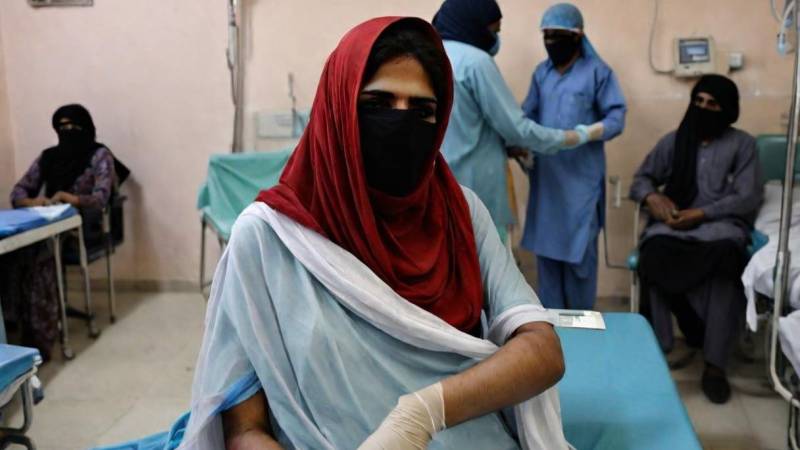
If you happen to travel down Jinnah Road in Quetta, the capital of Balochistan, you will invariably pass through a bustling area known amongst residents as the local red-light district. If you happen to pass through this area at night, you would find a large number of men and even some transgender sex workers waiting for customers.
But with unsafe sex practices common, the area has a higher percentage of people suffering from sexually transmitted diseases, including Acquired Immunodeficiency Syndrome (AIDS).
To make matters worse, there is little to no concept of getting tested for diseases, either among sex workers or their customers.
Shazi, a 21-year-old male sex worker who has been working in Quetta for the past two years, admits to frequently engaging in unprotected sex work because. He explains that often, using protection is not a choice that they can make, with many clients refusing to use it. Shazi says this puts him and his clients at risk of contracting sexually transmitted diseases, including the Human immunodeficiency virus (HIV) or AIDS.
Maria, a transgender sex worker who has been working for the past five years, says she has never taken a sexually transmitted disease test. This lack of testing means she could be carrying HIV without even knowing it and potentially putting herself and her customers at risk.
Dire consequences
The consequences of unprotected intercourse are dire, and Balochistan is already seeing the number of AIDS cases increase substantially.
In 2022, the number of registered AIDS cases in Balochistan was 1,745. But this number jumped by 271 to 2,016 registered cases in the first eleven months of 2023. If the number of unregistered cases is added, experts fear this figure could be even higher.
The Bolan Medical Complex Hospital says there are a high number of confirmed cases of AIDS among sex workers in Quetta.
Data provided by the district police office in Quetta suggested that approximately 50 commercial sex workers are engaged in this practice.
Moreover, areas such as Turbat and Lasbela are also reporting alarming numbers of AIDS cases.
Lacking awareness
Among the reasons cited for this explosive spread of AIDS and other sexually transmitted diseases in the province is the lack of awareness surrounding these diseases and how they are spread.
Many sex workers and their clients simply do not know about the risks of unprotected sex and the importance of using protection.
Dr Afzal Khan Zarkoon, the Manager for the AIDS Control Programme in Balochistan, warns that unless education, testing and access to healthcare services are increased, the number of unregistered AIDS patients could skyrocket to as high as 7,500 by next year.
"The increase in AIDS cases in Balochistan, especially in Quetta, can be attributed to the prevalence of unprotected sex among sex workers and their clients, coupled with a lack of awareness and access to healthcare services," said Dr Zarkoon.
He added that Balochistan, being the least populated province with limited healthcare facilities, is particularly vulnerable to the spread of AIDS.
"Urgent action is needed to tackle this issue and prevent further spread of the disease."
Complex situation
Human rights activist Jalila Haider acknowledges that the crisis is not as simple as it may seem to some. She adds that advocating for the criminalisation of commercial sex work might not be effective, as it provides income for many families.
Instead of criminalising sex work, Haider argued that the authorities should focus on establishing laws to protect the rights of sex workers. She said that for many, sex work is not a profession they have chosen happily but a means of survival.
"It's essential for the state to safeguard the rights of these individuals, ensuring they are protected from physical harm and abuse," she said, adding, "By recognising and respecting the rights of sex workers, Pakistan can work towards creating a safer and more equitable environment for all its citizens."
Under subsections of the Zina (rape and adultery) laws, selling sex is a criminal offence, as outlined in the Offence of Zina (Enforcement of Hudood) Ordinance VII of 1979. Despite this, there is no nationwide legislation which specifically addresses sex work, while the Zina laws criminalise extra-marital sex and are often applied to sex workers.
Ali Kakar, a prominent lawyer and President of the Quetta Bar Association, said that the sight of sex workers and transgenders walking the streets late at night in search of clients prompts him to question the effectiveness of state policies in safeguarding the rights of citizens. He observed that in Pakistan, there is a mindset which discriminates against transgenders and sex workers due to their profession — brought about due to lack of alternative opportunities.
Kakar emphasises the importance of creating a welfare state that guarantees the civic rights of all its citizens. He questioned why individuals would risk their lives and endure discrimination and abuse if the state provided them with adequate protection and support.
The lawyer believes that it is the responsibility of the state to enact laws which ensure the safety and well-being of sex workers. However, he lamented the absence of such protective legislation, highlighting a significant gap in legal safeguards for vulnerable communities.
Quetta city SSP Jawad Ahmed said that dealing with male sex workers engaged in unlawful activities is quite challenging for law enforcement personnel. He said that while police have apprehended individuals involved in these practices, they struggle to detain them for long periods due to the absence of specific laws governing sex work apart from evidence. Pressure from human rights activists to release these individuals adds another layer of complexity to the situation.

